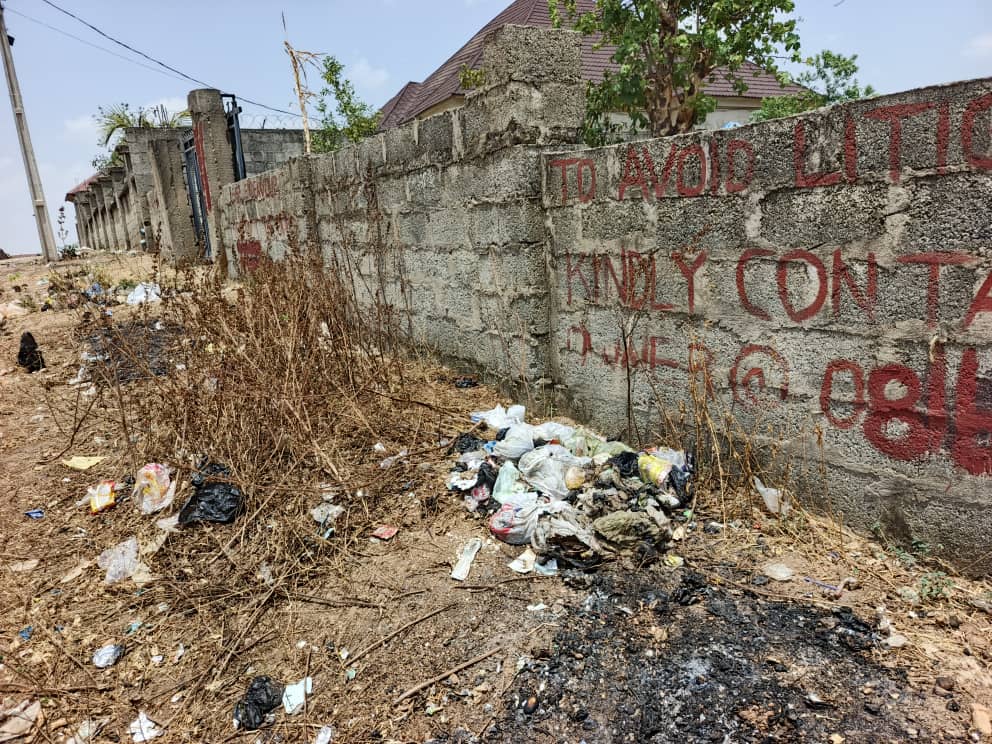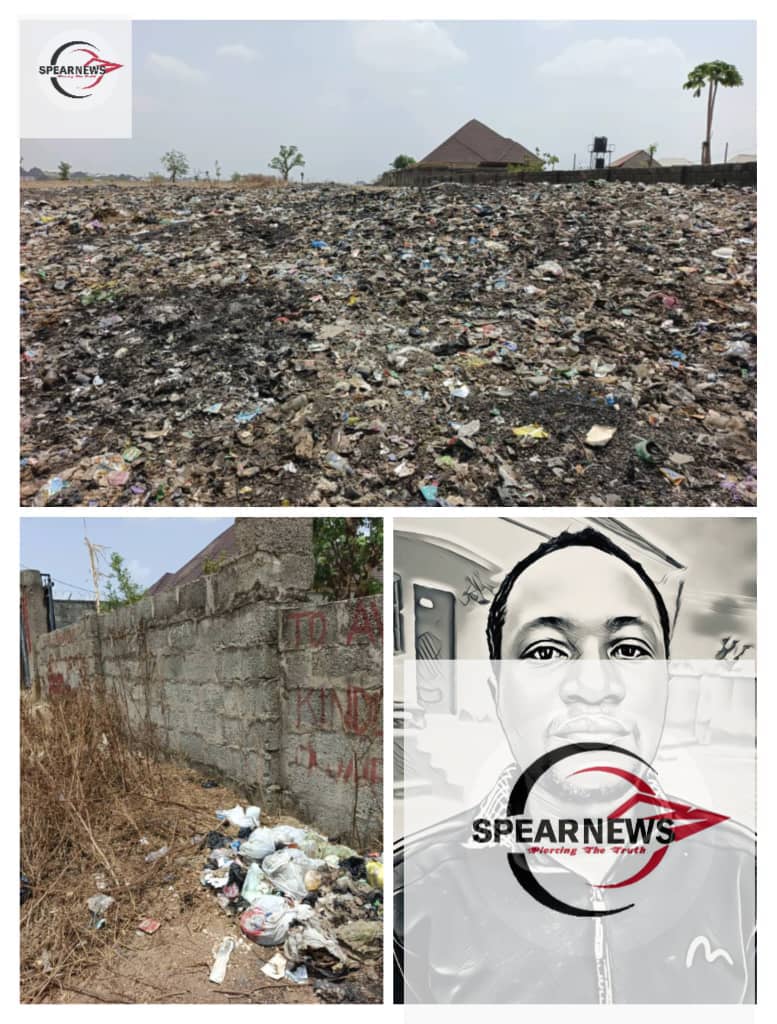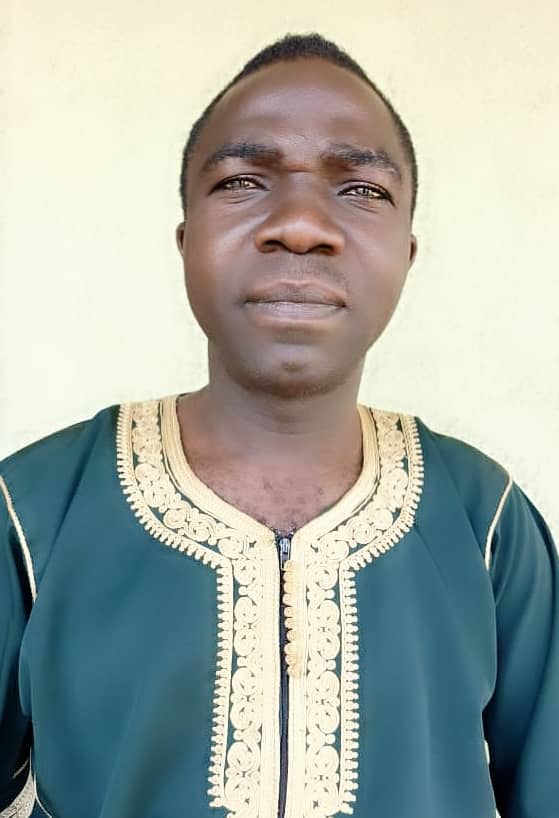By Eshioromeh Sebastian
The air hums with the constant drone of flies, a living cloud that grows thicker with every step towards the dump. Toxic liquid seeps from the rotting waste, carrying maggots and dangerous bacteria like cholera into the ground to the road. Thin dogs and scavengers roam the piles, searching for food in the ruined landscap. This was a community’s daily burden, a heap of rubbish accompany with environment pollution that won’t disappear.
Each morning in Jikwoyi, Phase 4, a settlement in the Federal Capital Territory, Abuja, begins with the same depressing sight residents have endured for more than six years. As workers set off for the day, children walk to school and market traders to the market, they all face a mountain of illegal rubbish dump right in their neighbourhood. The rotting waste isn’t just unpleasant to look at, the stench carries up to 300 metres in every direction.

When the rains come, conditions deteriorate further. Toxic liquid seeps from the decomposing rubbish, carrying dangerous bacteria like cholera into the soil. Stagnant puddles form the perfect breeding ground for disease-carrying insects, including flies, same flies that would later find their ways to houses around.
Investigations by SPEAR NEWS uncovered an even darker truth: this wasteland had, at one point, become a sanctuary for mai shara (waste scavengers) some of whom, residents alleged, morphed into security threats.
It remains a mystery to residents in the area how this land between Karu Extension, a fast growing estate, and Phase 4, became a dumping ground. According to our reporter, it began with just one discarded package, then others followed suit. Before long, what started as a minor nuisance snowballed into a full blown waste pile.
Some residents in the area told SPEAR NEWS that the situation worsened after a particular dump site in a nearby community, Phase 2, was evacuated by the government and before a mini stadium was built on the land. With Phase 4 being the nearest dumping ground, even from Dagbana, a nearby suburb, waste collectors started arriving in large numbers, hauling trash from as far as two kilometers away.

“Once they realised no one was stopping them, they spread the word, and the problem escalated,” said Joseph Inuwa, a resident in the community. “They overwhelmed us, some even resorted to threats if confronted.”
“They arrive daily, hauling filth from neighbouring areas to add to our misery,” shared Elder Richard Osumah, a resident and landlord in the community.
Inuwa and Richard are not alone. The people of Jikwoyi Phase 4, a corner of Abuja that time and governance forgot, wear the scars of neglect like a second skin. Their appeals to authorities to clear the dump, to end the desecration of land once marked for burials, were met with deaf ears.
The dump’s problems extend beyond smell and disease. On windy days, lightweight rubbish like plastic bags, blown onto nearby roofs and into people’s gardens, even reaching a neighbouring outdoor space that includes a restaurant and bar, a constant reminder of the neglect and health threat they endured.

This dismal situation persisted until July 2024, when Mr. Steve Osita (45) chose a different path from the fruitless complaints that had preceded him. While others had simply protested, he resolved to act. Fully aware the venture would bring him no financial reward- indeed, it would require huge personal sacrifice – he nevertheless pressed ahead, valuing his community’s health above monetary gain. He went on to mobilise.
“I have lived here four years now, watching this refuse heap grow larger with each passing year,” Steve recalled, shaking his head. “We kept waiting, assuming the community or authorities would intervene. But by 2023, the situation deteriorated so badly that the stench became unbearable. When I think how we escaped a major disease outbreak… frankly, it’s nothing short of a miracle.”

When asked how he prevented further dumping, his expression turned wry. “Convincing people? That was the real battle. Nigerians can be remarkably stubborn, especially when there’s no alternative site. Attempting to stop them single-handedly would have been asking for trouble. Thankfully, few community elders rallied behind me.”
“Some said it would not work when we started because efforts in the past didn’t yield results,” he continued, “but now those same doubters hold up our success as proof that determination conquers all. Some assumed I wanted compensation. This was about survival, not money.”
His solution was pragmatic: “We secured a police warning notice through the community chairman, that helped, though night-time dumping persisted. So we hired two local community persons as watchmen, paying them to guard the site dawn till dusk. Gradually, we saw some progress.”
Cleaning up the road part itself was harrowing. “Clearing the waste spilling onto the road was heartbreaking, the state of it. The initial phase costs close to N100,000 or more: labour, tools, protective gear. A friend and I thereafter covered the N20,000 monthly stipend for security until January, when dumping finally ceased, though a few persistent offenders still try their luck under the cover of darkness.”
“A community elder donated perimeter tape to fence the site, a symbolic gesture of support”, he revealed. “We have encouraged residents to use waste pickers instead, it costs barely N100. Change comes slowly, but it comes,” Steve concluded, surveying the land with SPEAR NEWS with quiet satisfaction.
Elder Richard Osumah, a landlord impacted by the waste dump, praised the efforts to halt illegal dumping. He even provided Steve and his team with tape to help fence off the area and prevent further waste disposal.
He urged the authorities to properly demarcate the land according to the development plan, construct the proposed road, and fence the designated burial ground to put a permanent stop to dumping in the area.
“There is plan and I expect the government to come and do the demarcation. There is a road between my property and the burial ground. They should do what is necessary; fence it and seperate the land from the burial ground”, he appealed.
Mr. Chris Asukwe, who operates a bar just 15 meters from the dump site, described the situation as a total nightmare for his business.
“I was losing customers because they no longer felt safe health-wise. Imagine people turning away and going elsewhere just to avoid the horrible stench from the dump. At first, I doubted their efforts would work, but I soon realised they were fully committed, investing their own money even without community support.”
These are a different kind of Nigerians, true patriots. They have earned my utmost respect”, he said.
We were overwhelmed by the threat- Landlord Association
Chairman of the Landlords’ Association, Mr. Akeem Kareem, described the experience as “horrible” in an interview with SPEAR NEWS.
“We are grateful to those gentlemen who pooled resources to make this work. At a point, we were overpowered by miscreants disguised as waste packers, who became a threat to the entire community,” he said.
“We have overcome one challenge, but the next step is to ensure the complete evacuation and a permanent ban on dumping in that area. Otherwise, these people will return as soon as they notice no one is monitoring the site. These young men have already done their part, and we can’t expect them to keep paying for security to guard the land indefinitely”, he said.
Our Cries Fall on Deaf Ears, Says Community Chief
When contacted for comment, the Mai Angwa (community leader) of Jikwoyi Phase 4, Chief Naphtali Ibrahim, told SPEAR NEWS that despite several attempts to clear the site, the local council had failed to act, despite their promises.
“We reached out through the councillor for Karu Ward, and they promised to deal with it,” he said. He recalled being invited when officials inspected the site before the 2023 elections, but since then, there had been no progress.
“I was relieved when I saw people clearing some of the waste by the roadside. I stopped to ask who was doing it and was told some young men from the community had taken it upon themselves to help. They’ve done well, and I praised their efforts, otherwise, we could have faced a disease outbreak.”
“I’m still appealing to the authorities to come and finish clearing the area and stop people from dumping there. The rainy season is coming, and if nothing is done, the problem will only get worse”, he said.
AMAC Speaks
Meanwhile, the Abuja Municipal Area Council has stated that efforts are underway by the local authority to clear the waste at the site.
Speaking to SPEAR NEWS, the councillor representing Karu Ward, Hussaini Dogo, confirmed that approval has been granted to begin work on-site.
“I wish you could come over to see the documents. I have followed the issue to the letter, and everything is in order. We are only waiting for payment to be processed, and then they will come to clear the area.”
When asked what measures the government was taking to prevent further dumping, he said plans are in place to provide an alternative site.
“That is not supposed to be a dumping ground. It’s a residential area, and dumping waste there is unhygienic. We are making arrangements to provide an alternative location for waste disposal,” he explained.
What next?
Despite Steve’s success, SPEAR NEWS observed that some still dump waste under cover of darkness. The bigger question remains: Will the government finally intervene to secure the area permanently?
Residents told our reporter that the FCT Waste Management Agency (FCT-WMA) had previously promised to address illegal dumps, but Jikwoyi’s case slipped through the cracks.
Street turned waste dump by defaulters
Steve’s efforts have brought temporary relief, but without structural intervention, the dump could return. “We have done our part,” he said, exhaustion and determination in his voice. “Now, we need the government to do theirs.”
For the people of Jikwoyi Phase 4, the fight for a clean, safe environment continues. Steve Osita has shown them change is possibl, but will it last?
Now Steve is trying to make a difference. But will his efforts finally bring relief to the people of Jikwoyi Phase 4 who have endured the pains of being abandoned to face a health threatening condition in their community?
SPEAR NEWS visit to the community shows that despite this efforts some persons still dump around the area even against the sensitization efforts made.









































Discussion about this post